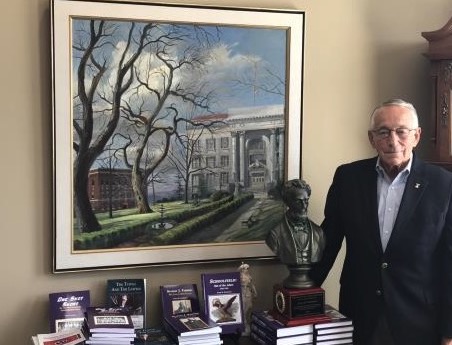
Jerry Summers
Preacher and former professional baseball player for the Chicago White Stockings and Philadelphia Phillies Billy Sunday (1862-1935) was never in Dayton in 1925 but his influence on the topic of debate in the Tennessee legislature and public certainly appear to have been instrumental in the enactment of the Butler Act (Anti-Evolution Act).
Sunday would appear in Memphis on two crusades in 1925 and praised the elected officials for passing the anti-evolution statute.
He was one of the original “hell fire and brimstone” preachers that could (and did) draw fundamentalists in excess of 200,000 attendees during the various events. Special nights like the separate Men’s Night, Women’s Night, Negro Night, and even unofficial Klan Night complete with white robes and masks filled the crusade site during the second 18-day crusade.
Sunday’s ability to preach and pray, sing and shout, and leap across the stage delivering rapid fire sermons before huge audiences was very effective.
With several legislators in the audience the pending vote in the Tennessee Senate on the bill received a significant advancement on its path to passage with 10 percent of the state’s population in attendance at the Bluff City crusades.
If television had been in existence, Sunday’s ability to arouse a crowd would have placed him in the forefront of the TV evangelists of later generations following the Scopes Trial.
A number of preachers spoke from their pulpits about the evils of Darwin’s theory of evolution in the days before the vote on passing the law and some barnstormed across the country in support of the Biblical words of Creationism.
Three time presidential loser, William Jennings Bryan, who became the most famous member of the prosecution team in Dayton, also received the enthusiastic support of Billy Sunday.
Although the famous evangelist decided not to participate in the Monkey Trial he was quoted in the Nashville Banner newspaper in an article styled "Billy Sunday Not to Go to Dayton” (July 7, 1925) as giving his endorsement of “any views expressed by William Jennings Bryan.”
The attention and hoopla given to the trial grew to what the original planners of the famous trial hoped would be an economic awakening for the little village but after a few days into the event interest would wane and ebb into history prior to the 100th celebration in July 2025 as the second “Trial of the Century.”
As to Billy Sunday after his conversion to Christianity and preaching career in 1896, he became one of the most dynamic and successful evangelists in the county and it has been estimated that “over his lifetime Sunday preached to over 100 million people without the aid of loudspeakers, radio, or television.”
He became best known for his attack on the evils of alcohol (he had been a drinker) in his famous “Booze” sermon that was used by advocates for the Prohibition Act of 1919 (Volstead Act): “I am the sworn eternal and uncompromising enemy of the liquor traffic. I have been and will go on fighting that damnable, dirty, rotten business with all the power at my command. I shall ask no quarter from that gang and they shall get none from me.”
(Whether Billy Sunday’s appearance in Rhea County would have stimulated the sinking attendance figures during the final days of the circus atmosphere would be a matter of speculation? However his fiery rhetoric and gyrations made famous on the “Sawdust Trial” preaching circuit would certainly have provided additional entertainment!)
----
If you have additional information about one of Mr. Summers' articles or have suggestions or ideas about a future Chattanooga area historical piece, please contact him at jsummers@summersfirm.com)